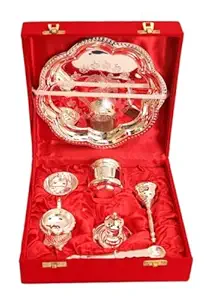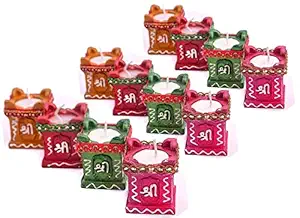હે સોનાનો ગરબો રૂપાનો ગરબો
સોનાનો ગરબો રૂપાનો ગરબો
હે ગરબો અમ્બા શીરે ગરબો અમ્બા શિરે
શોભતો રે હે માને હે માને હે માને
હેમનો ગરબો
સોનાનો ગરબો…
હે નવરંગ ચુંદડી માને શોભતી
નવરંગ ચુંદડી માને શોભતી
હે લિલુડો કંચવો હે લિલુડો કંચવો
ઓપતો રે મા ને હે માને હે માને
હેમનો ગરબો
સોનાનો ગરબો…
Overview of "Sonano Garbo Rupano Garbo"
Title & Meaning
'Sonano Garbo Rupano Garbo' is a traditional Gujarati Garba song performed during Navratri, highlighting devotion, festive spirit, and cultural celebration.
Artist & Recording Details
Performed by renowned folk artists, with both live and studio recordings capturing the essence of Navratri Garba nights.
Genre & Occasion
A devotional folk Garba song traditionally performed during Navratri to honor Goddess Amba and encourage communal celebration.
Language & Dialect
Lyrics are in Gujarati, using local dialects and expressions that reflect the cultural and spiritual richness of the festival.
Popularity & Versions
Widely sung across Gujarat, with multiple versions recorded over the years, both live in Garba events and in studios.
Lyrics Structure & Themes
Devotional Invocation
The song opens with prayers and invocations to Goddess Amba, creating a spiritual ambiance for participants.
Repetitive Chorus
Repetitive chorus lines promote group participation and help maintain rhythm during circular Garba dances.
Imagery & Symbolism
Lyrics are rich with imagery, depicting colors, rituals, and festive symbols that celebrate Gujarati culture.
Community & Togetherness
Emphasizes collective enjoyment, bringing people together through shared music, dance, and devotion during Navratri.
Emotional Resonance
Lyrics evoke joy, enthusiasm, and devotion, creating a highly engaging and participatory festival experience.
Musical & Performance Elements
Instrumentation & Rhythm
Uses traditional instruments such as dhol, dholak, and manjira to create lively beats and rhythmic energy.
Tempo & Dynamics
Starts moderately and gradually intensifies to energize dancers and maintain festive momentum throughout the night.
Live vs Studio Renditions
Live performances include audience interaction and extended verses; studio versions are polished and concise for recording.
Dance Cues & Movements
Lyrics guide dancers on claps, spins, and footwork, ensuring coordinated circular Garba movements.
Audience Participation
Encourages everyone to join in singing and dancing, making the performance inclusive and engaging.
How to Use & Share
Translations & Transliteration
Provide translations and transliterations for non-Gujarati speakers to understand and appreciate the song.
Audio / Video Embeds
Embed live Garba videos and audio tracks to increase engagement and provide a complete festival experience.
Printable Lyrics & PDFs
Offer downloadable and printable lyrics for practice, community singing, or personal enjoyment.
Performance & Dance Tips
Provide instructions on steps, attire, and timing to help participants enjoy Garba performances fully.
SEO & Social Media
Optimize content with keywords like Gujarati Garba, Sonano Garbo Rupano Garbo, Navratri Garba; include social sharing buttons for traffic growth.
Festival & Cultural Significance
Navratri Connection
Integral to Navratri celebrations, the Garba boosts festival energy, devotion, and communal participation.
Spiritual Meaning
Reflects devotion and reverence for Goddess Amba, seeking blessings for prosperity, protection, and happiness.
Cultural Heritage
Preserves Gujarati folk traditions and ensures that Garba music and dance are passed down through generations.
Community Bonding
Strengthens social ties and promotes togetherness through shared music, dance, and festival rituals.
Joyful Celebration
Creates a joyful and vibrant atmosphere, enhancing the overall festive experience during Navratri.
'Sonano Garbo Rupano Garbo' is a traditional Gujarati Garba song performed during Navratri, highlighting devotion, festive spirit, and cultural celebration.
Performed by renowned folk artists, with both live and studio recordings capturing the essence of Navratri Garba nights.
A devotional folk Garba song traditionally performed during Navratri to honor Goddess Amba and encourage communal celebration.
Lyrics are in Gujarati, using local dialects and expressions that reflect the cultural and spiritual richness of the festival.
Widely sung across Gujarat, with multiple versions recorded over the years, both live in Garba events and in studios.
The song opens with prayers and invocations to Goddess Amba, creating a spiritual ambiance for participants.
Repetitive chorus lines promote group participation and help maintain rhythm during circular Garba dances.
Lyrics are rich with imagery, depicting colors, rituals, and festive symbols that celebrate Gujarati culture.
Emphasizes collective enjoyment, bringing people together through shared music, dance, and devotion during Navratri.
Lyrics evoke joy, enthusiasm, and devotion, creating a highly engaging and participatory festival experience.
Uses traditional instruments such as dhol, dholak, and manjira to create lively beats and rhythmic energy.
Starts moderately and gradually intensifies to energize dancers and maintain festive momentum throughout the night.
Live performances include audience interaction and extended verses; studio versions are polished and concise for recording.
Lyrics guide dancers on claps, spins, and footwork, ensuring coordinated circular Garba movements.
Encourages everyone to join in singing and dancing, making the performance inclusive and engaging.
Provide translations and transliterations for non-Gujarati speakers to understand and appreciate the song.
Embed live Garba videos and audio tracks to increase engagement and provide a complete festival experience.
Offer downloadable and printable lyrics for practice, community singing, or personal enjoyment.
Provide instructions on steps, attire, and timing to help participants enjoy Garba performances fully.
Optimize content with keywords like Gujarati Garba, Sonano Garbo Rupano Garbo, Navratri Garba; include social sharing buttons for traffic growth.
Integral to Navratri celebrations, the Garba boosts festival energy, devotion, and communal participation.
Reflects devotion and reverence for Goddess Amba, seeking blessings for prosperity, protection, and happiness.
Preserves Gujarati folk traditions and ensures that Garba music and dance are passed down through generations.
Strengthens social ties and promotes togetherness through shared music, dance, and festival rituals.
Creates a joyful and vibrant atmosphere, enhancing the overall festive experience during Navratri.


